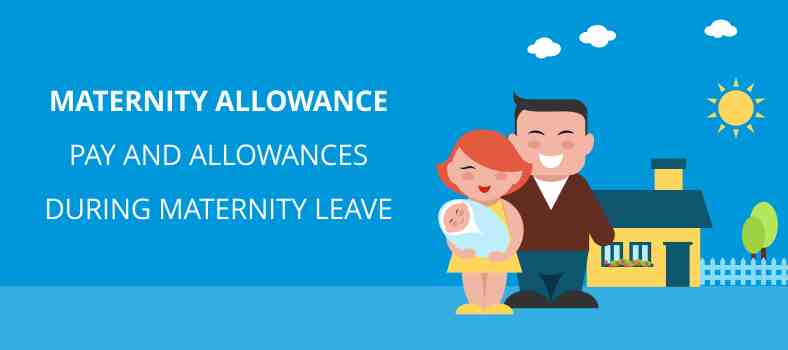INTRODUCTION
Maternity Allowance is a benefit paid to a pregnant woman who doesn't qualify for Statutory Maternity Pay. If a woman is self-employed, or an employee with an organisation but hasn't been working for an employer since a long time or the average pay is less than & £112.00 a week, she won't be able to claim Statutory Maternity pay, however, she may be entitled to another benefit called Maternity Allowance. A woman can claim Maternity Allowance as soon as she has been expecting for 26 weeks and the payment for the allowance can start 11 weeks before the baby is due.

WHO IS ELIGIBLE FOR A MATERNITY ALLOWANCE?
An expecting woman can either use a maternity entitlement calculator to check the eligibility or consult an accounting firm such as DNS Accountants to seek guidance regarding the allowance. Maternity Allowance is paid every 2 or 4 weeks. A woman can either get:
- For 39 weeks, £139.58 a week or 90.00% of the average weekly earnings (whichever is less)
- £27.00 a week for 39 weeks
- £27.00 a week for 14 weeks
Other parameters
A woman will be able to get a Maternity Allowance if in the 26 weeks before the baby is due:
- she was employed for at least 26 weeks
- she was earning £30.00 or more a week for at least 13 of the above said weeks (it may not be consecutive weeks)
- she can't claim Statutory Maternity Pay
- she is working and the average pay per week is less than £112.00
- she just left a job but qualifies for a Maternity Allowance
On the other hand, a woman is not eligible for a Maternity Allowance if she:
- is unemployed
- hasn't worked enough qualifying weeks
- earns less than £30.00 a week
Maternity Allowance for 39 weeks
An expecting woman might get Maternity Allowance for 39 weeks if either of the following applies:
- she is employed, but can't get Statutory Maternity Pay
- she is self-employed and pays Class 2 National Insurance (NI) contribution (including voluntary National Insurance)
- she recently stopped working
In the 26 weeks before the baby is due, she must also have been:
- self-employed or employed for a minimum of 26 weeks
- earning £30.00 a week or more in at least 13 weeks
For a self-employed individual
For a self-employed woman, to be able to get the full amount of Maternity Allowance, she must have paid Class 2 National Insurance (NI) for a minimum of 13 weeksout of the 26 weeks before the baby is due.The Department for Work and Pensions (DWP) will ensure if sufficient amount has been paid while making the claim and if there is any difference they will write to the concerned person. If a person hasn't paid enough Class 2 NI to get the full rate (£139.58 a week), she will get £27.00 a week for 39 weeks (an individual will still need to meet all the additional eligibility criteria to get this amount). However, an early payment of NI can make a person eligible for the full rate and HM Revenue and Customs (HMRC) will send a letter to inform how this can be done.
Maternity Allowance for 14 weeks
A woman might get Maternity Allowance for 14 weeks if for a minimum of 26 weeks in the 26 weeks before the baby is due:
- married or in a civil partnership
- not employed or self-employed
- take part in the business of self-employed spouse or civil partner
- the work done is for the business and unpaid
- spouse or civil partner is registered as self-employed with HMRC and should pay Class 2 NI
- spouse or civil partner is working as self-employed person
- not eligible for Statutory Maternity Pay or the higher amount of Maternity Allowance
If a person loses the baby
A woman might still qualify if the baby is either born alive during the pregnancy orstill-born since the start of the 24th week of pregnancy
HOW TO CLAIM MATERNITY ALLOWANCE
A person needs to complete the MA1 claim form and can either print it and send or fill it in online and print it. The notes in the form can be used as guidance or DNS Accountants can help with MA1 claim form. Once the form is complete it can be sent to the address on the form.
What to be sent with the claim form
As stated earlier, Maternity Allowance can be claimed once a woman is pregnant for 26 weeks and the payments can start 11 weeks before the baby is due. Documents that need to be furnished include:
- proof of the income, such as pay-slips or a Certificate of Small Earnings Exemption
- proof of baby's due date, such as a letter from the doctor
- SMP1 form - only applicable if a lady was refused Statutory Maternity Pay by the employer
An eligible candidate should get a decision on the claim within 24 working days.If a woman is eligible, a form will be sent confirming the entitlement and seeking confirmationabout the last day of employment before leave.
Appeal a decision
A candidate if not satisfied with the decision can appeal to the Social Security and Child Support Tribunal stating the reason for disagreement.
CONCLUSION
Maternity Allowance is tax free so if a woman qualifies for Maternity Allowance, she will get 90% of the average weekly earnings upto an utmost of £139.58 a week for up to 39 weeks. On the other hand, if a woman doesn't have enough qualifying weeks or made sufficient NI contributions, she could get £27.00 a week for upto 14 weeks. She will also receive Class 1 NI credits automatically while getting Maternity allowance. These credits are important because they count towards the State Pension claim. For any queries, we suggest visiting our website www.dnsassociates.co.uk and contact us on our # +44-333-130-5749 or e-mail at: enquiry@dnsaccountants.co.uk.
DNS ACCOUNTANTS IN THE UK
DNS Accountants is aneminent taxation and accounting firm in and around the UK and our groupof ACAs and CAs works with small-business owners and freelancers to manage their accounts and support them with issues encompassing Maternity Allowance in the UK. Our other services include:
- Value added tax (VAT) planning, along with others
- HR and payroll services
- Guidance regarding MA1 claim form
- Auto enrolment
- Self assessment
- Inheritance tax guidance, and individual and business taxation
- Accounting and bookkeeping services
For any business related queries, please contact us at www.dnsassociates.co.uk or follow us on Facebook, LinkedIn, and Twitter.
Any questions? Schedule a call with one of our experts.

.png)






